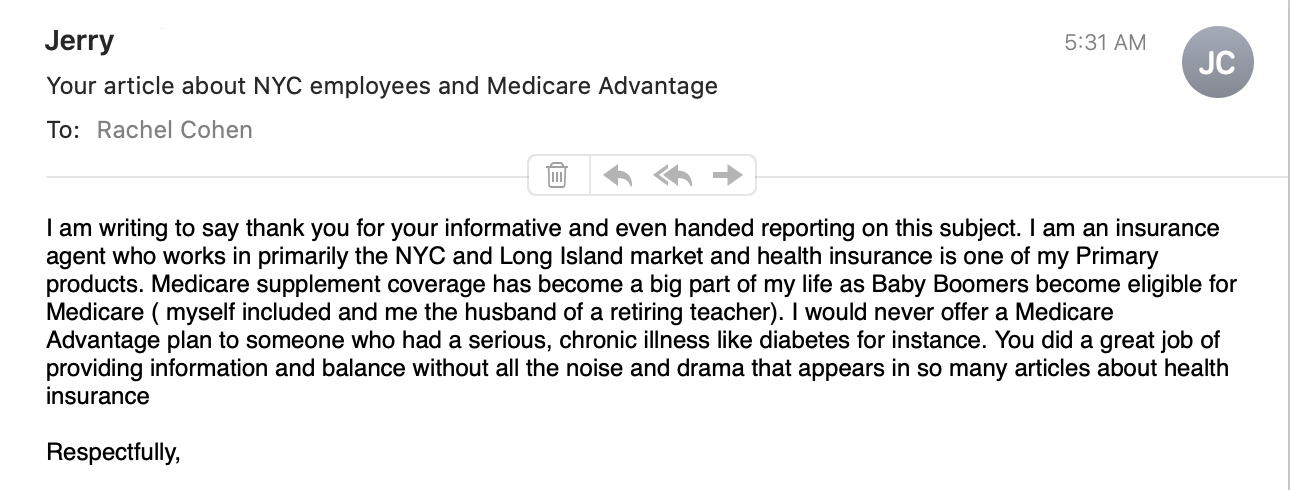Medicare Advantage and a 'Just Transition'
When I got a tip a few weeks ago about New York City unions negotiating a deal to shift 250,000 municipal retirees off Medicare to so-called Medicare Advantage, a privatized version of the public health insurance program, I hadn’t heard of it before. I started doing research to understand how Medicare Advantage works, how well it works, and what we generally know about it. The short of it is it started in the early 2000s as a way to both offer consumers more choice in their health insurance offerings and to cut Medicare costs.
The main draw for consumers is that unlike traditional Medicare, monthly premiums in Medicare Advantage plans are typically lower, and the private plans often include additional benefits like vision and dental that traditional Medicare plans don’t have. The convenience of “one-stop shopping” for benefits and lower premiums have been attractive incentives for seniors, many of whom live on fixed incomes.
Employers have found Medicare Advantage to be a great way for them to save costs on retiree healthcare, and private health insurance companies are finding it’s a great way for them to earn solid profits, since they actually still get paid by the government when seniors use fewer healthcare services.
The groups for whom Medicare Advantage may be far less… advantageous… are taxpayers and retirees, especially those retirees with complex health needs. Because while Medicare Advantage may be a pretty good deal when you’re a relatively healthy 67-year-old, as you get older and need access to different kinds of doctors, and need certain kinds of tests and treatment, the barriers to care can be considerably higher and more expensive than under traditional Medicare.
I was pretty surprised as I was researching to learn that despite 24 million Americans currently enrolled in such Medicare Advantage plans, or 43 percent of all Medicare beneficiaries, the federal government basically knows nothing about how it’s working.
“Surprisingly little is known about how much Medicare Advantage enrollees pay out of pocket for the services they receive overall, across plans, according to health condition, or in comparison to beneficiaries in traditional Medicare (with or without supplemental coverage),” wrote Kaiser Family Foundation researchers in the New England Journal of Medicine in 2018.
This past spring, in an annual federally mandated analysis on Medicare, the Medicare Payment Advisory Commission wrote that “the current state of quality reporting in [Medicare Advantage] is such that the Commission can no longer provide an accurate description of the quality of care.”
I have a story in The Intercept about the fear and outrage among NYC retirees, who quite understandably feel nervous that their unions and elected officials are looking to sell them out. I think it’s worth reading, but if you don’t believe me, take it from Jerry!
(If you’re ever wondering if journalists like hearing from readers, trust me we really do. So much of this work is pressing ‘publish’ and hoping it eventually gets in front of people who might find it useful/interesting, but we often have no great idea who it reaches.)
The second story I have to share was published in In These Times and looks at where things stand around a “just transition” for the climate crisis. A just transition refers to an ethically and economically secure transition for fossil fuel workers and communities that have depended on the fossil fuel industry as we decarbonize our nation in the fight against climate change. Resistance from energy workers (and their unions) and elected officials who represent communities worried about being decimated economically has been a major barrier over the years. Advocates see a just transition as not just morally necessary but politically essential.
But like a lot of things, it’s easier said than done. Some advocates also say hey, why are we just focusing on just transitions for energy workers, when there are all kinds of job dislocations happening with automation and globalization? Why not consider universal just transition policies, instead of targeted ones to specific industries like coal? Others will say sure that’s a good idea in theory but way too hard and we don’t have the time.
I took an overview of what the Biden administration has done so far around a just transition, what related conversations are happening in Congress, and where exactly some advocates hope lawmakers will think bigger and more boldly. You can read that here.
A friend of mine, who goes professionally by Ramona Li, published an op-ed last Friday, June 4, about why a deeper understanding of the legacy of June 4, 1989 — when the Chinese government violently cracked down on democracy protests in Beijing — has a lot to teach us about current labor conditions in both the U.S. and China. I found it very enlightening, especially given the recent anti-Asian violence in the U.S. and seemingly endless debate over who is “winning” the U.S.-China competition.
Thanks for reading + supporting this work. I have two more stories coming this week so will likely send a rare second newsletter in the next few days!



